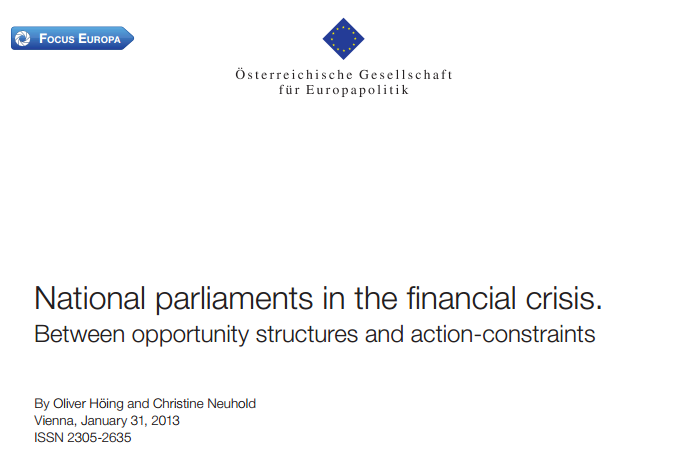Policy Recommendations
- In order to influence policy-making in the realm of financial affairs, parliaments have to live up to the challenge of coordinating matters with other parliaments, but also within their parliament;
- Parliaments should thus exploit the tools available to them (for example under the European Semester) which is currently not the case;
- Parliaments could become (one of) the fora for public debate on financial issues and as such attract (more) media attention;
- Measures outside the legal EU framework require parliaments to foster the control of their national government representatives.
Abstract
The current financial and debt crisis poses an unprecedented challenge for Europe in both economic and democratic terms. The Lisbon Treaty strengthened national parliaments (NPs) especially within the ordinary legislative procedure. However, recent measures to combat the financial and debt crisis have often been established outside the legal EU framework. This has far-reaching implications for the democratic legitimacy of decisions taken within the Economic and Monetary Union (EMU).
Consequently, the question arises which role national parliaments (can) play in the realm of the financial crisis. In this quest, NPs’ formal powers will be contrasted with their actual channels of influence. The instruments under scrutiny are the TSCG, the EFSF/ESM and the European Semester.
This contribution comes to the conclusion that parliaments do not yet fully exploit the legal instruments at their disposal.
****************************************
Introduction
The current financial and debt crisis poses an unprecedented challenge for the European Union both in economic and democratic terms. National parliaments – as the most important carriers of democratic legitimacy – are currently either exposed to tight constraints by external economic pressure or able to tie the hands of their governments in EU negotiations (Future of Europe Group 2012, Benz 2012: 1). This development runs parallel to the entry into force of the Lisbon Treaty (2009) which is often referred to as the “Treaty of Parliaments” (see among others Lammert 2009): it upgrades the role of the European Parliament (EP) and grants national parliaments influence in the EU policy-making process. To this effect, the Treaty has introduced “Provisions on Democratic Principles” stipulating that “national parliaments contribute actively to the good functioning of the Union” (Art. 12 TEU).
A cornerstone in this context is the mechanism of subsidiarity control, commonly referred to as the early warning system (EWS). Although not binding, the EWS provides national parliaments with the prerogative to influence EU policy-making by addressing the compliance of EU documents with the principle of subsidiarity (Kiiver 2012, Rothenberger and Vogt 2007). These provisions, however, are limited to EU legislation in a rather narrow sense. They do not apply to measures outside the legal EU framework to which most of the instruments dealing with the financial and debt crisis belong.
Consequently the issue arises which role national parliaments can play in the realm of the financial crisis. In this quest, NPs’ formal powers will be contrasted with their actual channels of influence, i.e. how national parliaments resort to their prerogatives in the practical political process and what they actually do to increase their say in the current crisis management.
The instruments under scrutiny are: the intergovernmental Treaty on Stability, Coordination and Governance in the Economic and Monetary Union (TSCG)[1] which aims at limiting public debt of the 25 signatory Member States.[2]; the EFSF[3] and ESM[4]which are intergovernmental treaties applying for Eurozone countries only and aim at providing financial guarantees to financially stricken Member States; and the European Semester – established within the legal EU framework – which aims at reducing economic imbalances.
Limiting public debt: the Fiscal Compact
The ratification of the Fiscal Compact provided some form of ex ante control for national legislatures. Most parliaments had to be informed before their governments were authorized to sign the new treaty. Some selected Member States, such as Sweden and Hungary, submitted the Compact to a so-called sovereignty check. However, this was more the exception than the rule. Nonetheless, governments had to take into account that the ratification of the Fiscal Compact partly required two-thirds majorities in their legislatures as well as public referenda (as it was the case in Ireland). To some extent, this also applies for the introduction of national debt brakes which “shall fully respect the prerogatives of national parliaments” (Art. 3 (2), TSCG). Generally, a need to find broad parliamentary coalitions for the ratification and implementation of this intergovernmental Treaty can be observed.
Concerning its daily work, Article 13 of the Fiscal Compact states that national parliaments and the EP “will together determine the organisation and promotion of a conference of representatives […] in order to discuss budgetary policies and other issues covered by this Treaty.” Since the Treaty is not in force, such a conference has not yet taken place. It also remains to be seen what impact such an endeavour will have; whether it is of a rather symbolic nature or actually impacts on the budgetary affairs of national parliaments.
Overall, the Fiscal Compact principally offers a number of opportunities for a European public discourse (Pernice 2012). This potential is, however, not fully exploited by national parliaments. Article 6 of the TSCG foresees ex ante reporting on national debt issuance. It stipulates that discussions and, where appropriate, coordination of all planned major national economic policy reforms – with a view to benchmarking best practices and working towards a more closely coordinated economic policy – takes place within the treaty framework (Article 11 TSCG). Consequently, parliaments can make use of these provisions to increase their say in EMU policy-making.
Providing financial assistance: the ESM and EFSF
The EFSF and the ESM apply to Eurozone countries only. However, also within the Eurozone parliaments have varying participation rights. Differing accompanying laws to the EFSF exemplify this: although each Member State is equal insofar as it sends one representative into the EFSF board of directors, different procedures exist in how far NPs must give their prior consent to each new credit line granted under the EFSF. Parliaments thus possess varying information and participation rights that governments must take into account. In Cyprus, for instance, no participation rights for the parliament are foreseen, while the German Budget Committee must approve each tranche of financial assistance in advance (Deutsche Bank 2011).
The ESM points into a similar direction. In its judgement from September 12 the German Constitutional Court set out that “the Bundestag must individually approve every large-scale federal aid measure on the international or European level […]” (German Constitutional Court 2012: par. 214)[5]. The degree to which national parliaments are involved in the day-to-day policy-making of the ESM therefore varies significantly.
The ratification of the Treaty Establishing the European Stability Mechanism (ESM) on the other hand led to far-reaching inter-parliamentary power-struggles as the Austrian case exemplifies. Although a simple majority was sufficient for the adoption of the ESM Treaty, the modification of Art. 136 of the Treaty on the Functioning of the European Union (TFEU)[6] required a two thirds majority in both chambers. The coalition government managed to secure the support of the Greens mainly by trying to guarantee that the parliament will be given strong participatory rights within the ESM framework. The two other opposition parties (FPÖ and the BZÖ) voted against the ESM in both chambers and prolonged the negotiations. After being outvoted, the FPÖ announced to bring a lawsuit before the Austrian Constitutional Court. As a concession to the opposition, two permanent sub-committees of the finance committee have been created to monitor the government’s ESM-related activities. It is noteworthy that without a decision of these committees the government can not adopt a position. (Miklin 2012)[7]. This example not only reflects the varying parliamentary procedures across Member States but also indicates that parliaments have the possibilty to create new fora in order to monitor the executive in the current EU crisis management.
Coordination of economic policies: the European Semester
In terms of coordination of economic policies, the European Commission has increasingly become a central authority. The European Semester aims to integrate and coordinate structural reforms and budgetary surveillance and consequently foresees strong linkages to the European Commission. The major innovation within this procedure is the fact that EU policy guidelines are adopted before national budgets are debated in parliament. Although the harmonisation of economic policies is coordinated by the European Commission, no formal tools exist to establish consultation between parliaments across national borders. The Commission drafts the Annual Growth Survey (AGS) which is approved by the European Council later on. The country specific recommendations are also approved by the Council and the European Council. NPs therefore have tools at their disposal to influence European institutions via their own governments. In principle, they also have the opportunity to influence country specific recommendations addressed to other countries.
Above all, the budgetary procedures within NPs need to respond to a new time table. Based on data of the 15th bi-annual COSAC report from 2011, great variation across national parliaments as to how they adapted to these challenges in the practical political process can be observed.
Figure 1: Adaptation of national parliaments to the European Semester
Source 1: Own calculations, based on the 15th COSAC Report 2011. Three criteria were evaluated: a) implementation of new procedures, b) input to AGS[8] and NRP8 c) debate in committees or plenary. No adaptation was scored 0, partly adaptation was scored 0,5 and full adaptation was scored 1.
In Belgium and Austria, the parliamentary chambers have not adapted any new tools to respond to these opportunities, whereas the Luxembourgian and Italian Chambers of Deputies[9] implemented new procedures, gave input to the government and the Annual Growth Survey and debated them in parliament. In order to cope with the European Semester, it is crucial that parliaments ensure better coordination within their parliament – across the affected committees – but also with other parliaments of EU Member States.[10]
Concluding remarks
Overall, we see the trend that measures to combat the current financial and debt crisis are established outside the legal EU framework. There is a risk that these measures are treated as “foreign policy” and as such constrain the decision-making rights of national parliaments. This specifically applies to the implementation phase of the TSCG and the EFSF/ESM. Nevertheless, there are increasing opportunities for a European public discourse, for instance within the framework of the Fiscal Compact. This potential is generally not fully exploited by national parliaments.
This leads us to the following policy-recommendations:
- In order to influence policy-making in the realm of financial affairs, parliaments have to live up to the challenge of coordinating matters with other parliaments, but also within their parliament;
- Parliaments should thus exploit the tools available to them (for example under the European Semester) which is currently not the case;
- Parliaments could become (one of) the fora for public debate on financial issues and as such attract (more) media attention;
- Measures outside the legal EU framework require parliaments to foster the control of their national government representatives.
National parliaments therefore do have tools at their disposal to control the executive in financial affairs although they do still not fully resort to them in the practical political process.
1)Also known as Fiscal Compact.
2) The United Kingdom and the Czech Republic did not sign the treaty in March 2012.
3) European Financial Stability Facility
4) European Stability Mechanism
5) Translation by the authors.
6) Article 136 TFEU regulates the stability mechanism for Member States whose currency is the Euro.
7) These committees concern the ‘Standing Committee on ESM Matters’ (Ständiger Unterausschuss in ESM-Angelegenheiten) and the ‘Standing Committee for ESM Secondary Market Matters’ (Ständiger Unterausschuss in Sekundärmarktangelegenheiten-ESM).
8) Annual Growth Survey and National Reform Programmes.
9) For a complete overview of the adaptation of national parliaments to the European Semester, see: COSAC (2011).
10) There are special provisions directed to a subset of Member States (Euro-Plus Pact and Euro area Member States).
- Benz, A. (2012). An Asymmetric Two-level Game National Parliaments in the Euro Crisis. Ottawa: ECSA-C Biennial Conference.
- COSAC (2011) Fifteenth Bi-annual Report: Developments in European Union Procedures and Practices Relevant to Parliamentary Scrutiny, Prepared by the COSAC Secretariat and presented to: XLV Conference of Community and European Affairs Committees of Parliaments of the European Union, 29 – 31 May 2011 Budapest.
- Deutsche Bank (2011): EFSF. Where do parliaments have a say in EMU policy-making? in: Frankfurt: Deutsche Bank Research.
- German Constitutional Court (2012): BVerfG, 2 BvR 1390/12 from September 12 2012, Paragraph Number (1 – 319).
- Future of Europe Group (2012): Final Report of the Foreign Ministers of Austria, Belgium, Denmark, France, Italy, Germany, Luxembourg, the Netherlands, Poland, Portugal and Spain (http://www.cer.org.uk/)
- Kiiver, P. (2012): The Early Warning System for the Principle of Subsidiarity. Constitutional theory and empirical reality. London and New York: Routledge.
- Kunstein, T. Wessels. W. (2012) ›What we hope, what we fear, what we expect: possible scenarios for the future of the eurozone‹, European View, 2012, Volume 11, Number 1, pp. 5-14, DOI 10.1007/s12290-012-0210-x, accessible from: www.springerlink.com/content/p870kq20507p2g06/fulltext.pdf.
- Lammert, N. (2009): Europa der Bürger – parlamentarische Perspektiven der Union nach dem Lissabon-Vertrag. Speech at the Humboldt University on December 1st 2009.
- Miklin, E. (2012) The Austrian Parliament, Interim Report on Austria for Handbook on National Parliaments, Palgrave (2014).
- Pernice et al. (2012): A Democratic Solution to the Crisis. Reform Steps towards a Democratically Based Economic and Financial Constitution for Europe, Baden-Baden: Nomos.
- Rothenberger, S. and Vogt, O. (2007) The “Orange Card”: A Fitting Response to National Parliaments’ Marginalisation in EU Decision-Making?. Paper presented at the WSP Conference “Fifty Years in Interparliamentary Cooperation”, 13 June, Berlin.
ISSN 2305-2635
The views expressed in this publication are those of the authors and not necessarily those of the Austrian Society of European Politics or the organisation for which the author works.
Citation
Höing, O., Neuhold, C. (2013). National parliaments in the financial crisis. Between opportunity structures and action-constraints, Vienna. ÖGfE-Policy Brief, 02’2013
Keywords
EFSF, ESM, European Semester, Fiscal Compact, National Parliaments, Financial and Debt Crisis








